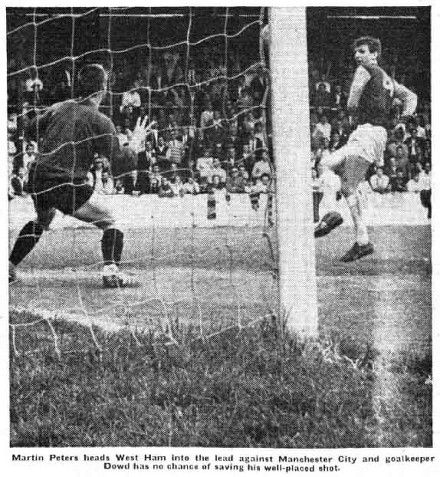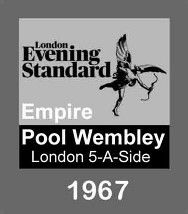theyflysohigh : Steve Marsh
email: theyflysohigh@btinternet.com
West Ham United Club Historian : Welcome to the Private memorabilia collection of 'theyflysohigh'


Congested Fixture List
by Roger Hillier
End of Season Fixture Congestion a Phenomena of the Modern Game?
Congested Fixture Lists in 1950s & 1960s
Towards the end of most seasons the media reports the predictable complaints from many Premiership managers about their teams having to play several matches in quick succession. It is a fact of football that the more successful a team, the longer their cup runs and the greater the number of games played. The price of success! But tight end of season schedules are nothing new.
A review of previous years shows that end of season fixture congestion has been happening for getting on for 60 years. We are not suggesting that teams in the 1950s through to the 1970s faced the same commercial pressures as today’s clubs, but nevertheless, the concept of playing several games in a week is not confined to today’s game.
We have come across a couple of West Ham examples from the early 1950s and the late 1960s where players faced seven games in 14 days. That’s a game every other day! No doubt there are plenty more similar examples but these caught the eye as the playing schedules comprised of a wide variety of matches. These included league games, friendlies, testimonials, a 5-A-Side tournament and for individual players, representative honours. Most of these “extra” fixtures would have been driven by commercial considerations, either for the clubs or individual players.
April 1953 – Advent of Floodlit Football
A significant factor in the rise of the number of games, tournaments and cups was the introduction of floodlights in the early to mid 1950s. Evening football meant clubs were no longer restricted to daytime games typically held on a Saturday afternoon. The first club to host a floodlit game was Arsenal in 1951. West Ham soon followed with their first floodlight game, a friendly against Tottenham Hotspur, on Monday April 16, 1953. In West Ham’s case this game sparked a frenzied April schedule. Three of the seven games were floodlit affairs.
The table below is a snapshot of the seven games the Hammers played in the space of 14 days. Not all of these games were of a competitive nature but the commercial aspects were important to the club. Even the friendlies were expected to pay their way and make a good contribution to the club’s income and expenses. Often the friendlies would carry a guaranteed match fee. But playing several games with little recovery time would have placed pressures on the playing staff. The frequent games and often extensive travelling ensured the players’ days were dominated by their passion, playing football.
Date: Opposition: Competition: Venue: Score:


The playing record over the 14 days was an impressive: Won 4, drew 2, and lost 1.



16th April 2 - 1 (Dixon, Barrett) 18th April 1 - 3 (Dixon) 20th April 3 - 3 (Dixon 2, Hooper)
1952-53
Player Appearances




23rd April 1 - 1 (Kearns) 25th April 1 - 3 (Dixon, Andrews, Hooper) 28th April 3 - 2 (Gazzard, Dixon, Barrett)
Trip to Penzance and St. Austell
We have been unable to confirm the line ups for the Cornwall tour games and cannot make a fully informed comment on the payers’ appearances in the two weeks in April. But from the information available, we know that at least 25 players were called on for one or more of the seven games. Though it should be noted that the Essex Professional Cup semi-final line up was predominantly of reserve strength. Four players, Malcolm Allison, Tommy Southren, Jim Barrett Jnr and Tommy Dixon, appeared in a least five of the seven games.
St. Austell goalscorers:
Gazzard 2, O'Farrell, Dixon, Allison, Southren, Gunning

Tommy Dixon
Top goal scorer was the recently joined centre forward, Tommy Dixon, with seven in his six games.


May 1967 - Upton Park to Wembley to Dublin
The tables below summarise the games and the 23 players called on in May. Including the representative game, England v Young England, played on the eve of the FA Cup Final, three Hammers appeared in all seven of the fixtures. The three were the World Cup Final Trio. Less than 12 months earlier the trio were gracing Wembley and now were happy to play in the less illustrious London 5-A-Side tournament, a colleague’s testimonial and a friendly in Dublin.
Mention should also be made of Ronnie Boyce. During May’s hectic two weeks he also made time on Thursday May 18, to appear in local club Romford’s testimonial for their long serving player, Tom Barnett.
The May 1967 results were disappointing. While the quintet won Wembley Pool’s Evening Standard London 5-A-Side Championships for the first time, the club lost two of the three home Division One games and drew the third.
Date: Opposition: Competition: Venue: Score:




6th May 1 - 6 (Charles) 9th May 0 - 2 10th May (Hurst 6, Peters, Moore, Boyce)
1966-67
Player Appearances




13th May 1- 1 (Peters)
15th May 5 - 9
(Bickles, Hurst, Moore, Mackleworth, og)
17th May 5 - 5 (Sissons 2, Hurst 2, Dear)
IN THE NEWS ...

Click the
"Picture Link"
to read all about the
1967 Competition




Six Hammers appear in 1967’s England v Young England



Though individual players received some recognition when six Hammers played in the England v Young England match, plus a seventh in the line ups was recently transferred Johnny Byrne. Moore, Hurst and Peters were in the England line up and Ron Boyce made an appearance for England as a 2nd half substitute. The Young England XI included John Sissons and John Charles. These appearances by Boyce and Charles in the Highbury game highlighted how close they both came to receiving England Under 23 honours.
Changes in make up of congested fixtures
Since 1953 and 1967 the game has seen significant change and progress. Though packing in several games late in a season is not a recent phenomenon. Back in the 1950s and 1960s there was no reporting of players or managers complaining about crowded playing schedules. These were times with fewer commercial pressures and when players appreciated and knew they were privileged to play football for a living. The Hammers were more than happy to play in friendlies at Upton Park, or travel to Dublin and the West Country.
Today Hammers’ fans look forward to congested end of season fixtures as it can only mean one thing, long and successful cup runs.
